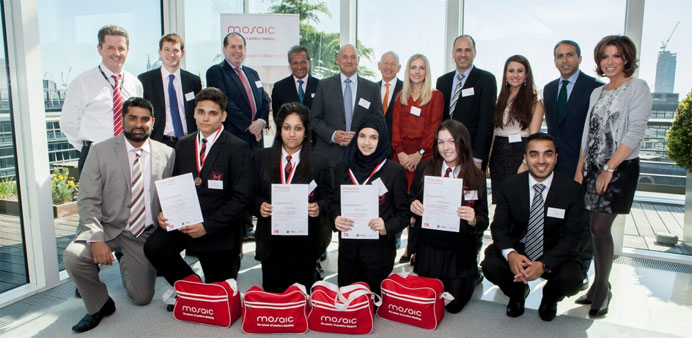Ayyoub Abouliaqin, Director General, Qatar Charity UK/Nectar Trust, (4th from right) with participants and judges at the Mosaic Enterprise Challenge Grand Finals - London
GT Exclusive
By Denise Marray/GT London Correspondent
Qatar Charity UK/Nectar Trust Director-General, Ayyoub Abouliaqin, was a keynote speaker this week at an inspiring educational event organised by Mosaic, a leading charity founded by HRH Prince Charles.
Nectar Trust is a sponsor of the Mosaic Enterprise Challenge in which schools from across the UK compete to clinch the prize for the best business idea. The inter-school business competition, designed to encourage entrepreneurial behaviour among young people, is supported by business mentors who lend their experience and expertise to the enterprising students.
Competition is fierce; with 4,000 students participating, the winning team from London secondary school Skinners’ Academy, had their work cut out in a keenly contested final to impress the judges with their business flair.
Speaking to Gulf Times at the event, hosted by global law firm Hogan Lovells, Abouliaqin said: “The five finalists were excellent – it’s a good opportunity for the Nectar Trust to develop our work in the UK. We are very happy to work closely with Mosaic and we will support the Enterprise Challenge next year. Our goal is to support the most disadvantaged people in society to achieve their dreams through education and economic empowerment.”
Jonathan Freeman, Managing Director of Mosaic, pointed out that the Enterprise Challenge draws in many schools from underprivileged areas. He praised the students for their enterprise and also thanked the many mentors who give their time to provide expert help and guidance. “The fact that they have successful businessmen and women prepared to back them and help them on their journey – giving up their time for free – is amazing,” he said.
He added: “These are schools operating in difficult areas – they don’t often see success. These young people come to London and beat so many other schools that has a huge impact on the whole school community. These kids are too often put down but these are young people making a difference.”
He thanked the Nectar Trust for its support: “We are so proud to have them involved; it shows their desire to give back to the communities in which they operate and are doing business and that is incredibly powerful,” he said.
Peter Englander, CEO of the Apax Foundation, which co-sponsored the project was on the judging panel. He was very impressed with the high level of the presentations. “The young people themselves come up with the ideas and the concepts and the mentors help give a context to their ideas and bring their experience,” he commented.
Speaking to some of the mentors, it was clear that they find the process of helping young people extremely rewarding.
Eddie Mir, whose career was with British Airways, Flight Ops, has been mentoring in a secondary school for four years. He explained: “I am retired and now devote my time to mentoring.” Asked what advice he had for young people, he said: “Have a dream, stay focused and don’t be surrounded by negativity.”
Varinder Dhaliwal, Head of Strategic Space Planning, Marks & Spencer, was asked how he found time with his demanding job to mentor. He agreed that at first the challenge seemed quite daunting. “Initially, you may feel ‘how can I commit the time?’ but when you see the impact and difference you can make just by carving out an hour or two, you find you can manage your time. Not only do you make a difference but you get a lot out of it too,” he said.
Noor Dhanani, a former head teacher who has done consultancy for the Office for Standards in Education, Children's Services and Skills (OFSTED) working to improve standards in schools said: “Let’s hope the young people can move on and achieve what they are dreaming about.”
Saker Nusseibeh, CEO of Hermes Investment Management, based in the City of London, and a board member of Mosaic, spoke about the beneficial ripple effect of the project: “It gives the young people an ability to see a future and to develop their business acumen. This feeds into their communities, helping them to become stronger and better, contributing to society at large."
The philanthropist, Lord Rumi Verjee, who founded Domino’s Pizza in the UK, shared some of his valuable experience at the event in an interview with Natasha Kaplinsky, a popular broadcaster. Lord Rumi’s family, successful and well established in business in Uganda, was forced out by Idi Amin and left with no option but to start all over again in the UK. He said that one of his most important achievements was ‘learning how to turn a disadvantage into an advantage’.
He stressed the importance of always striving for excellence. “If you can be excellent, others will follow. If you let mediocrity surround you – you will be brought down,” he cautioned.
Some people, he said, misguidedly thought that to be financially successful required a ruthless approach. But in his view being ‘decent’ was a sign of success.
He said it was important to accept that ‘sometimes you might fail’ and to learn to accept setbacks. Above all, he urged people to have self-belief: “The first person who has to believe in you – is you,” he advised.

